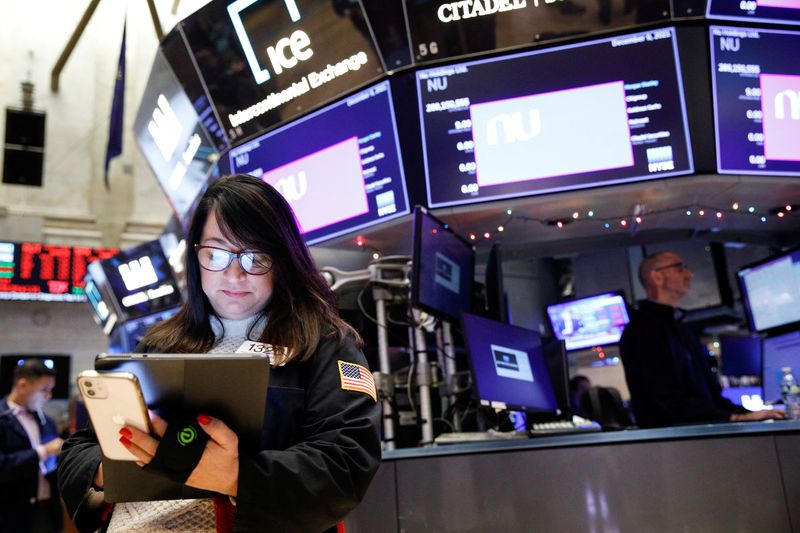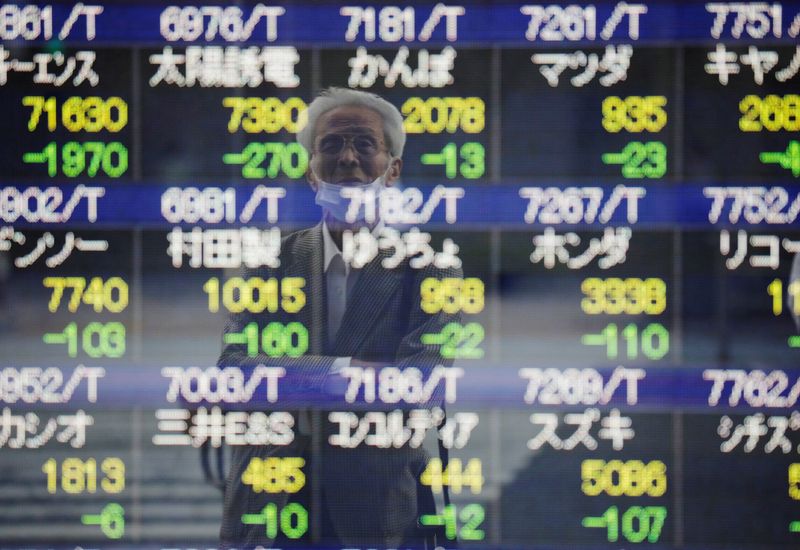By David Randall and Tommy Wilkes
NEW YORK (Reuters) -Global stock benchmarks and oil prices fell on Friday while safe havens such as the dollar and Treasury bonds rose as investors wrestled with rising numbers of Omicron cases and a hawkish turn from major central banks in the fight against inflation.
Asian shares closed near lows for the year, and broad-based European stock benchmarks slid 0.5%. Treasury bonds yields touched their lowest levels since early December.
"Central bankers have delivered a hawk for the holidays. The balance of 2021 will be spent focused on the ramifications from Omicron and any associated restrictions and/or delays in the return to normal," said Ian Lyngen, head of U.S. rates strategy at BMO Capital Markets.
MSCI's gauge of stocks across the globe shed 0.84%.
On Wall Street, the Dow Jones Industrial Average fell 531.08 points, or 1.48%, to 35,366.56, the S&P 500 lost 48.12 points, or 1.03%, to 4,620.55, and the Nasdaq Composite dropped 10.75 points, or 0.07%, to 15,169.68.
U.S. stocks have reversed all of their gains from Wednesday, when markets welcomed the Federal Reserve's commitment to tackle rising inflation with faster bond tapering and interest rate hikes next year.
The hawkish tilt from central banks this week, including the Fed and the Bank of England and to a lesser degree the European Central Bank, was initially greeted by a wave of buying from investors confident policymakers would curb higher inflation.
But the mood has turned gloomier as traders fret that markets pumped up on cheap money are vulnerable to even the smallest of pullbacks in stimulus.
"Volatility is rising again, lowering the predictability of what may happen next," said Ipek Ozkardeskaya, senior analyst at Swissquote.
The Bank of Japan dialed back some emergency pandemic funding on Friday but maintained its ultra-loose policy and extended financial relief for small firms, cementing expectations it will remain among the most dovish central banks for the foreseeable future.
Benchmark 10-year notes last rose 5/32 in price to yield 1.4072%, from 1.422% late on Thursday. The dollar index rose 0.728%.
Adding to the caution are worries that rising Omicron infection rates mean a rocky few months for the global economy, although most economists think the damage will be much less severe than in previous waves of COVID-19 cases.
"Ordinarily, in the wake of a more hawkish (Fed) outcome, yields would be expected to rise in anticipation of the Fed tightening cycle," said analysts at Westpac.
"However, there are competing dynamics at present, with ongoing inflation fears sparking the Fed's tougher rhetoric being offset by fears that economic growth will be derailed by Omicron in the near term," they added.

Pfizer (NYSE:PFE) said Friday that the coronavirus pandemic could extend through 2023.
Oil prices fell, with U.S. crude losing 2.72% to $70.41 per barrel and Brent dropping to $73.18, down 2.45% on the day.
